|
FOCUS
ON DANIEL - LESSON 2
The
Life and Times
Daniel 3 and 4
Persecution. It's
happening in countries all over the world. In one country thousands of
Christians have been sold as slaves. It happened to a little girl named
Akuac from one of the southern tribes in her country. She was abducted
by militiamen and taken north. Her master forced her to work long hours
in a kitchen where she slept and survived on table scraps. He tried to
make her follow his religious faith, giving her a different name and forcing
her to follow his customs. But little Akuac wouldn't give up her faith.
She prayed and sang hymns in secret whenever she could. She clung to her
Christian convictions for seven years until a Swiss charity group bought
her back from slavery.
It's happening in
a country where many believers have been harassed and even tortured. One
courageous pastor was jailed twenty-five times. On one occasion he was
hung upside down, and hot oil was poured on his feet. But he kept his
faith alive. It's happening in countries and towns around the globe. The
rights of Christians are trampled, and they stand up for their convictions
against the threat of persecution.
The story in the third
chapter of Daniel could have been taken from today's headlines. It's one
of the significant chapters in the history of suffering believers. It
sheds light on what many are experiencing in the present. And it shows
us why they're able to cling to God—even in the worst of times.
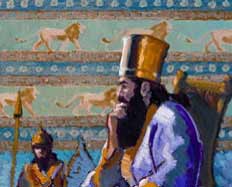 A
monarch named King Nebuchadnezzar, whom we met in Daniel 1 and 2, continues
to play a key role in this part of Daniel's story. His pride and desire
for power and recognition lie behind two important events which we'll
examine in this lesson. A
monarch named King Nebuchadnezzar, whom we met in Daniel 1 and 2, continues
to play a key role in this part of Daniel's story. His pride and desire
for power and recognition lie behind two important events which we'll
examine in this lesson.
EVENT
#1: The Golden Image (Daniel 3)
All Babylon was buzzing
with a marvel that had appeared on the Plain of Dura:
"Have you seen it? It's unbelievable!"
"A huge statue
of a man made out of pure gold?"
"Oh if I could
just have one of its toes!"
As the morning sun
crested the hills around the city, its blinding rays danced and shimmered
off the golden head and shoulders of this man-made image. Visible for
miles, it was the talk of Babylon.
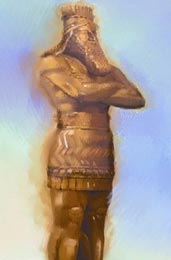 King
Nebuchadnezzar had been deeply impressed by the image made of different
metals and clay (Daniel 2) he had seen in his dream—especially
by that head of gold. For a while he honored Daniel and the God of heaven.
But after a time Nebuchadnezzar appears to have had second thoughts.
He felt a little resentful. God had said another kingdom would arise
and overthrow Babylon. Well, maybe Nebuchadnezzar could edit this prophecy
a bit. What if he constructed a replica of this image—but made
it all gold from head to toe? It would be his way of creating an image
of Babylon as the eternal empire. So the king decided he would do just
that. He would order all administrative officials to gather before the
image, bow down to it, and pledge undying allegiance to him. King
Nebuchadnezzar had been deeply impressed by the image made of different
metals and clay (Daniel 2) he had seen in his dream—especially
by that head of gold. For a while he honored Daniel and the God of heaven.
But after a time Nebuchadnezzar appears to have had second thoughts.
He felt a little resentful. God had said another kingdom would arise
and overthrow Babylon. Well, maybe Nebuchadnezzar could edit this prophecy
a bit. What if he constructed a replica of this image—but made
it all gold from head to toe? It would be his way of creating an image
of Babylon as the eternal empire. So the king decided he would do just
that. He would order all administrative officials to gather before the
image, bow down to it, and pledge undying allegiance to him.
Nebuchadnezzar's
engineers and architects went to work. It wasn't long until an image
towered over the Plain of Dura; it stood approximately one hundred feet
tall and twelve feet across. This image was really an act of rebellion.
The king was defying God's word. He was creating a counterfeit to the
true prophetic symbol Daniel had shown him. Instead of telling the people
of his kingdom the truth about the future, as God had revealed it to
him, he deceived them. Nebuchadnezzar was acting on behalf of Satan,
the originator of lies and deception (John 8:44). His image ultimately
stood in opposition to Jesus the Way, the Truth, and the Life. And so,
in Bible prophecy, Babylon came to represent the opposite of what God
stands for—lies, deceit, and eternal death trying to replace truth,
faithfulness, and eternal life. This concept comes into clear focus
in the book of Revelation.
Nebuchadnezzar was
making a very important choice, one with eternal consequences. Three
young Hebrew men had to do the same.
1.What was the penalty for not bowing down to the golden image King Nebuchadnezzar
had set up? (Daniel 3:6.)
Being thrown alive into a fiery furnace.
Being hanged.
Being thrown into a den of lions.
Nebuchadnezzar was
using political authority to enforce a certain kind of worship. In later
chapters of Daniel and in the book of Revelation, we will see how this
combination of church and state is pictured in prophecy. It's part
of a counterfeit religious system that will rear its ugly head again and
oppress God's people.
The first of the
Ten Commandments states, "You shall have no other gods before Me.
You shall not make for yourself any carved image, or any likeness of anything
that is in heaven above, or that is in the earth beneath, or that is in
the water under the earth; you shall not bow down to them or serve them"
(Exodus 20:3-5).
Those on the Plain
of Dura who wanted to serve the God of heaven were faced with a terrible
dilemma: they could disobey God's commandment and bow down to King Nebuchadnezzar's
gold statue—and live. Or they could obey God's commandment and refuse
to bow down to it—and die.
As the elite of Babylon
gathered around Nebuchadnezzar's image, there was quite a fanfare. Horns
rang out; cymbals clashed. The military might of Babylon encircled the
crowd—soldiers in full armor. For most of those assembled this was
a celebration. Food and drink flowed freely. They partied into the night.
But then suddenly the assembly grew quiet. The king's spokesman was shouting
instructions. As soon as the royal band struck up, as soon as horns, flutes,
lyres, and pipes sounded, everyone was to bow down and worship the king's
golden statue. In the background dark smoke ascended from a brick kiln,
emphasizing the consequence of defiance—death in a fiery furnace.
The spokesman gave
a signal, and the band began to play. Barely a note was heard before the
sea of people surrounding the image flattened; everyone lay prostrate
on the ground. A smile must have crept across Nebuchadnezzar's face
at the spectacle. But his pleasure was short-lived. Several Chaldeans
rushed to the king's side and delivered unpleasant news.
2.
As everyone bowed down to the image, what did King Nebuchadnezzar learn
that made him furious? (Daniel 3:12.)
Daniel's three friends-Shadrach, Meshach, and Abednego-were making
fun of the king's
golden statue.
Daniel's three friends-Shadrach, Meshach, and Abednego-had gone home before
the
crowd was dismissed.
Daniel's three friends-Shadrach, Meshach, and Abednego-had refused to
bow down to
the king's golden statue.
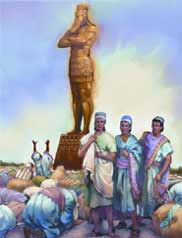 Nebuchadnezzar
was furious! He ordered Shadrach, Meshach, and Abednego brought before
him. He told them he would give them one more chance to bow down. If
they didn't, they'd be thrown immediately into the blazing furnace.
What a scene! Prostrate officials were peering out of the corners of
their eyes at the commotion near King Nebuchadnezzar. There they stood,
three young Hebrews who defied the king. These young men didn't need
more time to think about it. They gave the king an answer immediately. Nebuchadnezzar
was furious! He ordered Shadrach, Meshach, and Abednego brought before
him. He told them he would give them one more chance to bow down. If
they didn't, they'd be thrown immediately into the blazing furnace.
What a scene! Prostrate officials were peering out of the corners of
their eyes at the commotion near King Nebuchadnezzar. There they stood,
three young Hebrews who defied the king. These young men didn't need
more time to think about it. They gave the king an answer immediately.
3. Shadrach, Meshach, and Abednego told the king that if he threw them into
the fiery furnace:
(Daniel 3:17.)
the
chief officers of the kingdom would rebel against the government.
God would deliver them alive from the flames.
future generations would honor them as martyrs to
the king's anger.
4. Shadrach, Meshach, and Abednego also told the king that even if they died in the fiery furnace
they would: (Daniel 3:18.)
not serve Nebuchadnezzar's gods or worship his golden image.
be taken to heaven immediately.
die with the satisfaction of knowing they had defied the king.
 Wow!
What would you have done in that situation? You're facing a raging furnace;
black smoke swirls above it. Sparks fly; you can feel the intensity
of the heat on your face. Death is certain. If those three Hebrews had
hesitated, if they'd thought about saving their necks, Satan might have
had an opportunity to make them conform. But they clung to their faith
as an anchor and made a quick response to follow their Lord unconditionally. Wow!
What would you have done in that situation? You're facing a raging furnace;
black smoke swirls above it. Sparks fly; you can feel the intensity
of the heat on your face. Death is certain. If those three Hebrews had
hesitated, if they'd thought about saving their necks, Satan might have
had an opportunity to make them conform. But they clung to their faith
as an anchor and made a quick response to follow their Lord unconditionally.
Shadrach, Meshach,
and Abednego believed that the God of heaven was at their side. But they
also acknowledged that He does not always choose to deliver us in the
way we would like. They knew about the prophet Urijah's fate. A
few years earlier he'd given clear warnings aimed at King Jehoiakim's
corruption. That cowardly monarch had him executed (Jeremiah 26:20-23).
Have you ever felt
isolated as the "different" one? Maybe you didn't laugh
at a cruel or racist joke; maybe you chose not to watch some popular TV
show because it was mean-spirited or vulgar; maybe your beliefs make you
seem the "odd one" at work. Remember, God is a great deliverer,
but sometimes He allows us to witness for Him in what may appear to be
defeat rather than victory. When Jesus felt very isolated and burdened
in the Garden of Gethsemane, when He was facing death on the cross, He
still managed to pray: "Thy will be done, not My own." God
will help you do the same. The Lord can use apparent defeat and isolation
to bring about victory and reconciliation. Just make sure that you keep
manifesting the graciousness and friendliness of Christ.
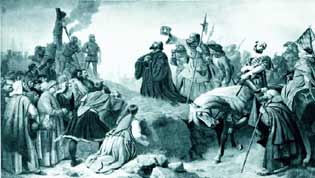 John
Huss is an example of a person who suffered for his faith—and yet
remained gracious to the end. This Czech reformer stood firm for gospel
truth against the corrupt church of his day. But he was always eager
to learn. When the Council of Constance demanded that he renounce his
biblical teachings, Huss replied, "I would most gladly recant before
all the world every falsehood and every error I ever have thought of
saying or have said." But his accusers tried to bully instead of persuade,
and Huss was condemned. At
the execution grounds Huss underwent a "ceremony of degradation." When
bishops intoned a final curse, "We commit your soul to the Devil!"—Huss
answered, "And I commit it to the most merciful Lord Jesus Christ."
As the wood and straw, piled up to his neck were lit, Huss began singing,
"Christ, Thou Son of the living God, have mercy on us." His lips were
still moving silently when he died. John
Huss is an example of a person who suffered for his faith—and yet
remained gracious to the end. This Czech reformer stood firm for gospel
truth against the corrupt church of his day. But he was always eager
to learn. When the Council of Constance demanded that he renounce his
biblical teachings, Huss replied, "I would most gladly recant before
all the world every falsehood and every error I ever have thought of
saying or have said." But his accusers tried to bully instead of persuade,
and Huss was condemned. At
the execution grounds Huss underwent a "ceremony of degradation." When
bishops intoned a final curse, "We commit your soul to the Devil!"—Huss
answered, "And I commit it to the most merciful Lord Jesus Christ."
As the wood and straw, piled up to his neck were lit, Huss began singing,
"Christ, Thou Son of the living God, have mercy on us." His lips were
still moving silently when he died.
5. What did King Nebuchadnezzar do when the three Hebrews refused to bow
down to his golden image? (Daniel 3:19-23.)
He commanded that they be thrown immediately into the fiery furnace.
He pardoned them because they had served his government with such distinction.
He put them into prison to be tried for treason.
6. When happened to the three young men when they were thrown into the
fiery furnace? (Daniel 3:24, 25.)
They died at once.
Nothing; the flames didn't harm them at all.
They were able to tell the people about the true God before they
died.
7. What did King Nebuchadnezzar see in the fire? (Daniel 3:25.)
The dead bodies of the Daniel's three friends.
Angels encouraging Daniel's three friends to die as faithful martyrs for
God.
Daniel's three friends walking around unharmed-and a fourth individual
who looked like the Son of God.
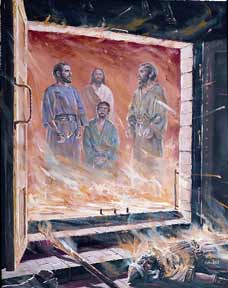 What
a powerful example of God's power and protection! Jesus stood in the
furnace with His friends! Through this great deliverance He says to
you and me, "You don't have to go into the furnace by yourself. I will
go with you. In fact, I will walk into the flames before you do and
lead you step-by-step through the fire. So bring Me your problems, your
trials, fears, and disappointments. Bring Me your longings, your desire
to be changed. Bring to Me your faith—no matter how little or how
big." What
a powerful example of God's power and protection! Jesus stood in the
furnace with His friends! Through this great deliverance He says to
you and me, "You don't have to go into the furnace by yourself. I will
go with you. In fact, I will walk into the flames before you do and
lead you step-by-step through the fire. So bring Me your problems, your
trials, fears, and disappointments. Bring Me your longings, your desire
to be changed. Bring to Me your faith—no matter how little or how
big."
Have you ever felt
like you were walking in the flames without God? You never have to again.
Listen to God's promise: "You are Mine. When you pass through
the waters, I will be with you; And through the rivers, they shall not
overflow you. When you walk through the fire, you shall not be burned,
nor shall the flame scorch you. For I am the Lord your God" (Isaiah
43:1-3).
To
think about: When you read these verses
what do you want to say to Jesus?
Read
Daniel 3:26-30.
8.
What did the fire do to the three Hebrews? (Daniel 3:26, 27.)
Nothing; they were not harmed at
all by the flames.
It only burned their clothes and hair; otherwise they were not hurt.
It burned them up.
9. Following this amazing experience, what did King Nebuchadnezzar say
about the God whom the
Hebrews worshiped? (Daniel 3:28, 29.)
"From this day on, the God of the Hebrews shall be included
among the other gods of Babylon."
"Blessed be the God of the Hebrews
because no other god can deliver like this."
"I ask forgiveness of the God of the Hebrews for trying to
take the lives of these young men."
10. What happened to Shadrach, Meshach, and Abednego following this incident
with the fiery furnace? (Daniel 3:30.)
They returned to their home country of Judah for a time to rest.
They left government service and began teaching the people about the true God.
The king promoted them to higher positions in the government of Babylon.
So, Nebuchadnezzar decided to honor God. What else could he do? All his
officials around him had witnessed the power of God. They had seen how
He honors those who follow Him. Unfortunately the king did not remain
humbled before the God of heaven. Chapter four continues our story.
EVENT
#2: Eating Like a Cow (Daniel 4)
What Nebuchadnezzar
saw at the fiery furnace impelled him to decree that anyone who spoke
against God was to be killed. But he himself forgot about God and suffered
greatly. What he learned as a result is recorded in Daniel chapter 4.
This is a remarkable document: the personal testimony of the most powerful
monarch of that time revealing how God intervened in his life.
11. What did King Nebuchadnezzar say was his purpose in telling what happened
to him as recorded
in Daniel chapter 4? (Daniel 4:1, 2.)
He wanted to justify his behavior to all the officials of the kingdom.
He wanted to declare the signs and wonders that God had performed in his life.
He wanted to leave an accurate record of the events of his life for future generations.
12. What did the king see in the dream God gave him? (Daniel 4:10-12.)
A giant tree reaching high into the sky.
A great mountain that seemed to be on fire.
A tremendous hail storm that destroyed much of his kingdom.
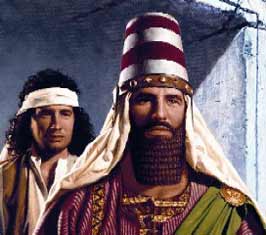 Nebuchadnezzar
had another disturbing dream. Once again he called the wise men before
his throne. This time the king remembered what he'd dreamed. But his
wise men were unable to tell him what it all meant. Then Daniel walked
in. Nebuchadnezzar told him about the dream. In his dream the king had
seen a tree grow to such a height that it was visible from everywhere
on Earth. It provided shelter and food for animals and birds. But then
an angel (watcher) is sent from heaven. He's commanded to cut down the
tree and chop off its branches. The stump of the tree was to be left
in the ground and an iron band clamped around the stump (Daniel 4:13-16). Nebuchadnezzar
had another disturbing dream. Once again he called the wise men before
his throne. This time the king remembered what he'd dreamed. But his
wise men were unable to tell him what it all meant. Then Daniel walked
in. Nebuchadnezzar told him about the dream. In his dream the king had
seen a tree grow to such a height that it was visible from everywhere
on Earth. It provided shelter and food for animals and birds. But then
an angel (watcher) is sent from heaven. He's commanded to cut down the
tree and chop off its branches. The stump of the tree was to be left
in the ground and an iron band clamped around the stump (Daniel 4:13-16).
The angel decreed,
"Let it be wet with the dew of heaven, and let him graze with the
beasts on the grass of the earth. Let his heart be changed from that of
a man, let him be given the heart of an animal, and let seven times pass
over him" (vss. 15, 16).
With its ominous
shift from "it" to "him," Daniel realized at once
what this dream meant. And it filled him with apprehension. This was not
good news. But Nebuchadnezzar urged him to reveal what he knew. And so
Daniel explained the dream:
13. What did the tree that the king saw in his dream symbolize? (Daniel 4:20-22.)
The prophet Daniel.
The kingdom that would follow Babylon.
King Nebuchadnezzar.
14. In his dream, the king saw the tree being cut down and the stump encircled
with an iron band.
What did this represent? (Daniel 4:25.)
The prophet Daniel would be executed.
The kingdom that would follow Babylon would itself be destroyed in turn.
King Nebuchadnezzar would lose his reason and be driven from human society to live
with animals until he realized that the God of heaven rules in the affairs of earth.
15. How long would it be until King Nebuchadnezzar would be restored as ruler of Babylon? (Daniel 4:25, 26.)
Seven years.
Ten years.
Twenty years.
The message of the
dream is this: Unless Nebuchadnezzar changed his ways, he would become
so deranged that he'd act like a cow who had to be turned out into the
fields to eat grass. He would remain in this condition for seven years.
His uncut and uncombed hair would mat together until it looked like eagle
feathers. His fingernails would grow long and curl like the claws of an
eagle. Today, psychiatry identifies an affliction like this as "boanthropy,"
a condition which makes people think they are a cow and start acting like
an animal.
Nebuchadnezzar, however,
would be able to escape this calamity if he surrendered to God and chose
to follow Him.
16. How long was it after King Nebuchadnezzar's dream that the kingdom was taken from him and he was
driven from human society? (Daniel 4:28-33.)
Six months.
Twelve months.
Forty-two months.
Overlooking his capital,
the king exclaimed, "Is not this great Babylon, that I have built?"
Babylon was indeed a magnificent metropolis. Nebuchadnezzar's father,
Nabopolassar, had defeated the Assyrians and assisted in the rebuilding
of Babylon, which had bedn destroyed in 689 B.C. The city boasted many
beautiful palaces, temples, shrines, and rooftop gardens. In fact, its
Hanging Gardens were eventually considered one of the Seven Wonders of
the World.
Nebuchadnezzar wanted
all this glory for himself. He forgot that it is God who sets up kings
and who removes them. And so his enormous ego snapped. The king lost touch
with reality.
17. What was Nebuchadnezzar's attitude after his reason was restored? (Daniel
4:34.)
He cursed God for the loss of his sanity and his kingdom.
He praised, blessed, and honored the God of heaven.
He blamed his Babylonian gods for not being able to protect him.
Nebuchadnezzar at
last made the right decision, the right commitment. He had faced the same
big question that Daniel faced, the same big question that Shadrach, Meshach,
and Abednego all faced—"Will I be a faithful friend of God?"
That is the ultimate question for you and me. It calls us to make a decision.
Will we make a commitment to stand with God—even in the worst of
times? To whom do you relate the most—Nebuchadnezzar or the three
Hebrew young men? God can help you to be faithful, just like the three
young men, if you ask Him. Why not ask Him today?
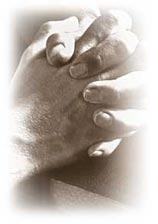 During
World War II a young Christian named Desmond Doss trained to become
a medic. Later on the islands of Guam, Leyte, and Okinawa, he bravely
dodged bullets and grenades to rescue his wounded buddies. Desmond wanted
to live a consistent Christian life—even in the midst of war. And
even his most profane fellow soldiers came to respect him. At first
they'd sometimes throw boots at him when he knelt by his cot for prayer.
But during fierce fighting on the islands of the Pacific, they began
to regard his quiet courage with awe. During
World War II a young Christian named Desmond Doss trained to become
a medic. Later on the islands of Guam, Leyte, and Okinawa, he bravely
dodged bullets and grenades to rescue his wounded buddies. Desmond wanted
to live a consistent Christian life—even in the midst of war. And
even his most profane fellow soldiers came to respect him. At first
they'd sometimes throw boots at him when he knelt by his cot for prayer.
But during fierce fighting on the islands of the Pacific, they began
to regard his quiet courage with awe.
On May 5, 1945, Desmond's
unit was ordered to launch a major assault on the Maeda Escarpment. This
fifty-foot cliff was the key to controlling Okinawa. But on that fateful
day, the Japanese had decided to launch an attack from the same location.
Desmond's platoon of 200 men charged up a hill. Within a few minutes they'd
sustained a hundred casualties. The platoon withdrew under a barrage of
bullets and mortars—all except Desmond Doss. He stayed behind with
the wounded. For the next few hours he scurried around the top of the
cliff with a rope litter he'd rigged up, and managed to lower his comrades,
one after the other, to safety. All this time machine gun fire splattered
around him. But miraculously, Desmond wasn't cut down. On that day, seventy-five
fellow soldiers would owe their lives to him.
For his extraordinary
courage in battle, Desmond Doss was awarded the Congressional Medal of
Honor by President Truman. Desmond always said that it was his faithfulness
to Bible study and prayer that sustained him during this difficult time.
He had dared to be a Daniel, and God honored him for it.
Each of us can find
the same strength and the same resolve. We can find it as we build a relationship
with God through Bible study and prayer. He will sustain us through the
battles and struggles we face in everyday life. It may be a difficult
marriage. It may be a loved one with a chronic illness. It may be conflicts
on the job. It may be unfulfilled dreams. But whatever your difficulties,
God is reaching out and promising, "I am the answer. Come to Me,
and I will give you peace and rest" (see Matthew 11:28-30).
—
Prayer —
Father, thank
You for Your promise of being with me in the good times and in the tough
times. I reach out to You right now and commit my life into Your keeping.
Thank You for caring about me and meeting my needs. In Jesus' name I pray.
Amen.
|